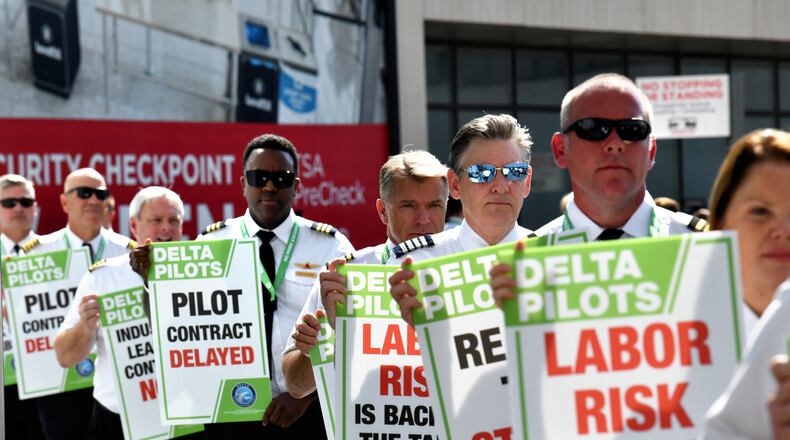Pilots at Delta Air Lines raised the stakes in labor contract talks by voting in favor of authorizing union leaders to call a strike in the event that negotiations come to a head.
But the vote does not mean a strike is planned. Instead, it’s intended to send a message to management that the airline’s nearly 15,000 rank-and-file pilots are unified, as union negotiators from the Air Line Pilots Association (ALPA) push for higher pay. The vote comes following a difficult summer travel season in which Delta pilots conducted informational picketing outside several major U.S. airports amid concerns about staffing challenges as air travel rebounds from the worst of the pandemic.
Of the pilots union’s members at Delta, 96% participated in the vote and 99% of ballots cast were in favor of the authorizing union leaders to call a strike if necessary, according to ALPA.
The pilots would have to clear a number of hurdles before they would be granted the right to strike under the Railway Labor Act, which governs airline and rail labor relations.
“Delta pilots are not on strike, so this authorization vote will not affect our operation for our customers,” Delta management said in a written statement. “ALPA’s stated purpose for the vote is simply to gain leverage in our pilot contract negotiations, which continue to progress under the normal process set by the Railway Labor Act and in partnership with the National Mediation Board.”
The pilots union in 2019 began labor talks for a new contract with Delta, then suspended negotiations during the pandemic. It resumed mediated talks with Delta management early this year. The last contract was negotiated in 2016.
Last month, after the union said Delta management presented a proposal for pay that fell “substantially short” of expectations, it opened the strike ballot. Voting continued through Monday.
Jason Ambrosi, who heads the Delta pilots union and was recently elected as national president of the Air Line Pilots Association starting in 2023, said in a written statement that Delta pilots “sent a clear message to management that we are willing to go the distance to secure a contract that reflects the value we bring to Delta Air Lines as frontline leaders and long-term stakeholders.”
“Our goal is to reach an agreement, not to strike,” Ambrosi added. “The ball is in management’s court. It’s time for the Company to get serious at the bargaining table and invest in the Delta pilots.”
The pilots have picketed several times this year at Hartsfield-Jackson and other major airports across the country in their push for a new contract. Earlier this year they raised concerns over staffing issues that were driving more overtime and what the union called “fatiguing schedules.”
The union wrote an open letter to customers saying the pilots shared in passengers’ frustration over delays and cancellations that proliferated early in the summer season, calling the situation “unacceptable.”
Delta said it and the union “have made significant progress in our negotiations and have only a few contract sections left to resolve.”
“We are confident that the parties will reach an agreement that is fair and equitable, as we always have in past negotiations,” Delta said in its statement.
Before a strike would be allowed, the National Mediation Board would have to decide further mediation would not be successful, release the two sides from mediation and offer arbitration, followed by a 30-day cooling off period.
About the Author
The Latest
Featured



